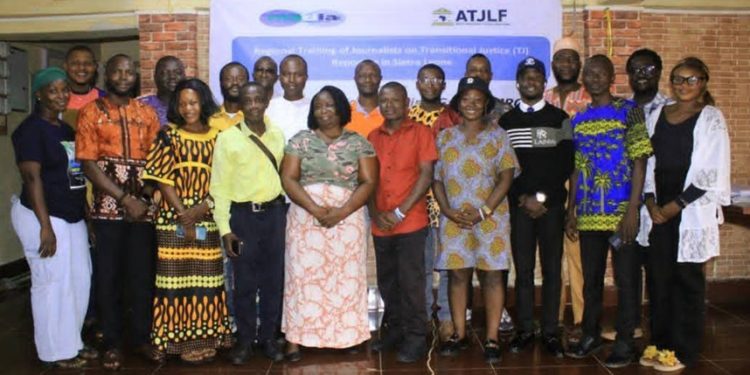By Hassan Osman Kargbo
The Media Reform Coordinating Group (MRCG), with support from the Africa Transitional Justice Legacy Fund (ATJLF), has concluded a one-day regional training on Transitional Justice Reporting for journalists from the South-East Region. The event took place on Friday, September 19, 2025, at the Fears Hotel in Bo City.
The training, according to MRCG’s National Coordinator, Dr. Francis Sowa, was designed to strengthen the capacity of media professionals by equipping them with the knowledge and skills to improve their reporting on Transitional Justice. He explained that the initiative forms part of a wider strategy to shift the national conversation on transitional justice matters by engaging the media and communities directly.
Dr. Sowa noted Sierra Leone’s long history of political and social transitions and stressed the importance of confronting past human rights violations and atrocities from the civil war. He said transitional justice remains a critical tool for promoting peace and stability, warning that unresolved grievances could undermine societal harmony.
He emphasized that transitional justice issues remain relevant in present-day society, making it essential for journalists to understand and report on them responsibly. According to him, similar trainings in the past have enabled media professionals to generate stories that fostered greater awareness and accountability in Sierra Leone.
Media Consultant and Lead Facilitator, Alhaji Abdul Rahman Jalloh, provided participants with a deeper understanding of the concept of transitional justice. Drawing on scholarly perspectives, he explained that transitional justice includes efforts to address past human rights abuses and offers mechanisms for dealing with violations of humanitarian law following conflict or repression.
Jalloh stressed that the media has a central role in making complex transitional justice concepts accessible to the public. He pointed out that accurate reporting not only promotes understanding but also contributes to reconciliation and healing. He also highlighted challenges journalists often face when covering transitional justice issues and shared practical guidelines to ensure effective and professional reporting.
Speaking at the event, the Regional Manager of the Independent Media Commission (IMC), Sheku Mansaray, reinforced the significance of transitional justice in upholding human rights, justice, peace, security, and good governance. He urged journalists to remain mindful of the sensitivity of the information they publish and warned against content that could trigger conflict or social unrest.
The Regional Secretary of the Sierra Leone Association of Journalists (SLAJ), Diana Veronica Fillie Blackie, commended MRCG for organizing the engagement. She described the initiative as a continuation of MRCG’s mentorship and professional development programs for journalists. She encouraged her colleagues to apply the lessons learned to produce impactful stories that inform the public, strengthen accountability, and contribute to national progress.
With the conclusion of the training, participating journalists and mentees are expected to begin producing content on transitional justice issues, applying their new knowledge to raise awareness and promote peace building.
The event is one in a series of regional engagements by MRCG aimed at ensuring journalists across Sierra Leone are well-informed and better prepared to report responsibly on issues of transitional justice and human rights.










